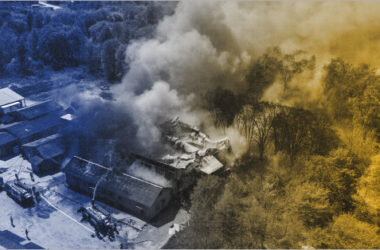There are numerous stakeholders involved in bringing construction projects to life. Insurance is a vital part of the industry due to the high stakes involved as well as the inherent risks.
Importance of Property Insurance for Construction
One of the primary reasons why insurance is crucial in construction is that it provides coverage for various risks that may occur during the project. These risks may include damage to property, injury to workers, or even legal liabilities. By having insurance coverage, construction companies can protect themselves from significant financial losses that may result from these risks.
Another important role of insurance in construction is that it helps to mitigate the risks associated with the project. Insurance companies often encourage construction companies to identify potential risks and take measures to mitigate them. This can include implementing safety measures, improving construction practices, and ensuring that workers are adequately trained.
Insurance also helps to ensure that construction projects are completed on time and within budget. By having insurance coverage, construction companies can avoid delays and disruptions that may result from unforeseen circumstances. This is essential for the success of any construction project.
Types of Insurance in Construction
Having the right insurance coverage is crucial for any construction project. By understanding the different types of insurance available, property owners and contractors can protect themselves against potential losses and liabilities. There are several types of insurance available for construction projects, including:
1.Builders Construction Insurance
Builders Risk Insurance, also known as course of construction insurance, covers damage or loss to a building under construction. It protects against damage caused by fire, theft, vandalism, and natural disasters. This insurance is usually purchased by the property owner or the contractor.
2. Public Liability Insurance
Public Liability Insurance covers third-party claims for injury or property damage caused by the construction project. This insurance is essential for construction projects that involve working in public areas or near existing structures. It protects against claims made by members of the public, such as pedestrians, motorists, and neighboring property owners. Liability insurance can also cover legal fees and settlements resulting from lawsuits.
3. Professional Indemnity Insurance
Professional Indemnity Insurance protects architects, engineers, and other professionals against claims of negligence or errors and omissions. It covers legal costs and damages resulting from professional advice or services provided.
4. Workers’ Compensation Insurance
Workers’ Compensation Insurance covers employees who are injured or become ill as a result of their work on the construction project. It provides medical treatment, disability benefits, and death benefits to employees and their families.
5. Property Insurance
Another type of insurance that is commonly used in construction is property insurance. This insurance covers damage or loss to the construction site, materials, and equipment due to accidents, natural disasters, or theft. Property insurance can also cover any additional costs incurred due to delays caused by such incidents.
Risk Management in Construction
Risk management is an essential aspect of any construction project. It involves identifying, assessing, and controlling potential risks that may arise during the project’s lifecycle. By managing risks effectively, construction companies can reduce the likelihood of accidents, delays, and cost overruns. Insurance plays a critical role in risk management by providing financial protection against unforeseen events.
Risk Identification
The first step in risk management is to identify potential risks. This involves examining the project’s scope, design, and site conditions to identify any potential hazards. Some common risks in construction projects include:
- Weather-related risks such as floods, hurricanes, and storms
- Safety risks such as falls, electrocution, and equipment accidents
- Design risks such as errors or omissions in the project plans
- Financial risks such as cost overruns, currency fluctuations, and inflation
- Legal risks such as contract disputes, regulatory compliance, and liability claims
Risk Assessment
Once potential risks have been identified, the next step is to assess their likelihood and potential impact. This involves evaluating the probability of a risk occurring and the potential consequences if it does. Proper risk assessment helps construction companies prioritise risks and allocate resources accordingly.
Risk Control
The final step in risk management is to implement risk control measures to reduce the likelihood or impact of potential risks. This may involve modifying the project design, changing work practices, or using protective equipment. Insurance is also an important risk control measure as it provides financial protection against unforeseen events.
Insurance Claims Process in Building Construction Insurance
In construction projects, insurance claims are a common occurrence. Insurance claims can arise from a variety of issues, including accidents, damage to property, and injuries to workers. The claim process for insurance in construction projects can be complex and time-consuming. It involves several steps, which can be broken down into the following steps:
- Reporting the claim: The insured party must notify the insurance company of the claim as soon as possible. The notification should include all relevant details, such as the date and time of the incident, the nature of the claim, and any witnesses.
- Investigation: Once the claim is reported, the insurance company will investigate the claim to determine the extent of the damage or injury. This may involve site visits, interviews with witnesses, and a review of documentation.
- Evaluation: Based on the investigation, the insurance company will evaluate the claim and determine whether it is covered under the policy.
- Payment: If the claim is covered, the insurance company will pay the claimant according to the terms of the policy.
Conclusion
In the discussion above, we have seen that insurance provides financial security in the face of unexpected events, helping to ensure the successful completion of projects and safeguarding against potential liabilities. Whether it’s protecting contractors, owners, or third parties, insurance serves as a vital tool in managing the inherent risks of construction projects. It fosters confidence, encourages investment, and ultimately contributes to the growth and sustainability of the construction industry.
If you have any queries on any topic related to any commercial insurance product, you may contact BimaKavach. Here, you can get the best recommendation for any insurance product in just 5 minutes.
Frequently Asked Questions
- Is it possible to insure a flat that is under construction?
The insurance cover for an apartment cannot be purchased during construction because it is integral to the overall structure of the building
2. What is the role of insurance in ensuring project completion?
Insurance plays a crucial role in ensuring project completion by providing financial protection against events that could potentially derail the project. This includes events such as accidents, damage to property, and injuries. By having insurance in place, the project team can focus on completing the project without worrying about the financial implications of these events.
3. What are the consequences of not having insurance in a construction project?
Not having insurance in a construction project can have serious consequences. If an accident or other unforeseen event occurs, the costs associated with the event will have to be borne by the project team. This can lead to delays, cost overruns, and even project failure. In addition, the project team may be held liable for any damages or injuries that occur as a result of the event.
4. What are the Methods of Dispute Resolution in Insurance Claims?
Disputes can arise during the claim process, particularly if the insurance company denies the claim or disputes the amount of the claim. In such cases, the parties may need to resort to dispute resolution mechanisms, such as mediation or arbitration. Mediation involves a neutral third party who helps the parties reach a settlement. Arbitration involves a neutral third party who makes a binding decision on the dispute. Both mediation and arbitration can be faster and less expensive than going to court.








